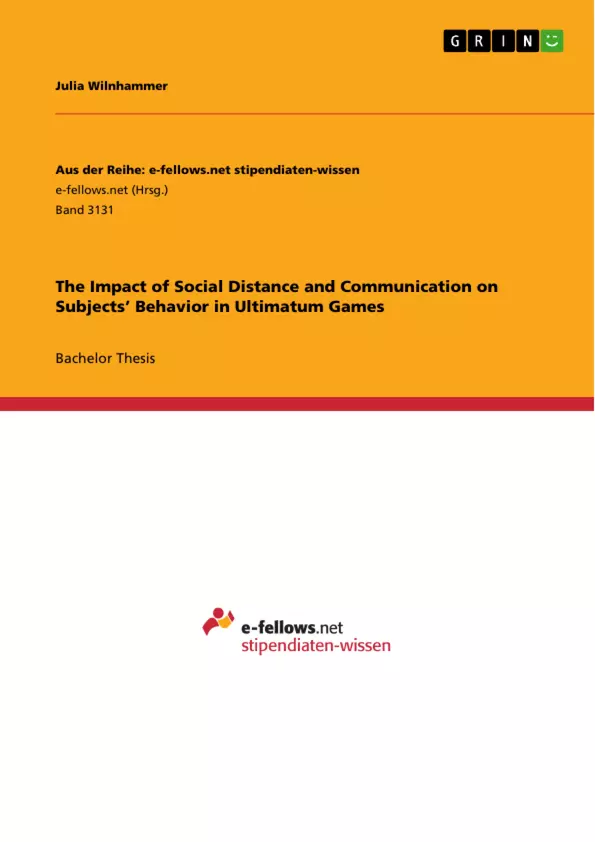The discrepancy between real-life and laboratory settings regarding anonymity is relevant for researchers concerning the realism of their findings. To close this gap, some studies began to shed light on altering the social embedding of experiments, e.g. by
varying the degree of anonymity and social distance between players and incorporating communication.
This work presents a selective review of studies covering these issues and compares those findings. Results show that decreased social distance leads to higher offers from the proposer and to a decreased acceptance threshold of the mean
responder. After communicating with the responder, proposers offer a higher amount. Responders increase their acceptance threshold in treatments with game-related discussions, but do not adjust it after game-free conversations. The implications of these findings and the determinants of players’ behavior in the Ultimatum game are clarified.
Thereby, this work outlines researchers’ endeavor of reaching higher levels of realism for results in Ultimatum game experiments. It closes by indicating the trade-off between the precision of laboratory experiments, which maintain anonymity, and enhanced realism of experiments which manage to design more field-like settings.
Inhaltsverzeichnis (Table of Contents)
- 1 Introduction
- 2 Theory
- 2.1 Ultimatum Game by Güth et al. 1982
- 2.1.1 Definition
- 2.1.2 The Framework of the Game
- 2.1.3 Predicted Subject Behavior
- 2.2 The Strategy Method
- 2.1 Ultimatum Game by Güth et al. 1982
- 3 A Collection of Ultimatum Game Experiments
- 3.1 Experimental Results of Thirty Years of Research
- 3.2 Contradicting Material Opportunism
- 3.3 Subjects' Reasoning in the Game
- 3.4 Subjects' Motives for Contradicting Material Opportunism
- 4 The Impact of Social Distance on Subjects' Behavior in Ultimatum Games
- 4.1 The Concept of Social Distance
- 4.1.1 The Term
- 4.1.2 Social Distance along Dimensions
- 4.2 Social Distance in the Ultimatum Game
- 4.2.1 A Procedure for Inducing Social Distance in Experimental Games
- 4.2.2 The Influence of Social Distance on Subjects' Behavior
- 4.1 The Concept of Social Distance
- 5 The Impact of Communication on Subjects' Behavior in Ultimatum Games
- 5.1 The Concept of Communication
- 5.1.1 The Term
- 5.1.2 Decreased Social Distance Between Communicators
- 5.2 Communication in the Ultimatum Game
- 5.2.1 The Nature of Conversation between Subjects
- 5.2.2 The Impact of Pre-Play Communication on Subjects' Behavior
- 5.1 The Concept of Communication
- 6 Results and Discussion
- 6.1 Results
- 6.2 Discussion
- 6.2.1 Incentives Elicited by Social Distance Variations and Communication
- 6.2.2 Methodological Issues
Zielsetzung und Themenschwerpunkte (Objectives and Key Themes)
This work examines the impact of social distance and communication on subjects' behavior in ultimatum games. By reviewing existing research and comparing findings, the study aims to understand how variations in social distance and communication influence decision-making in these games.
- The role of anonymity and social distance in influencing subject behavior in ultimatum games.
- The effect of communication on proposers' offers and responders' acceptance thresholds.
- The trade-off between maintaining anonymity for experimental precision and achieving higher realism in field-like settings.
- The implications of these findings for understanding subjects' motivations and decision-making processes in economic games.
- The need for further research exploring the dynamics of social distance and communication in economic experiments.
Zusammenfassung der Kapitel (Chapter Summaries)
Chapter 1 provides an introduction to the topic, highlighting the relevance of social distance and communication in economic experiments. Chapter 2 presents a theoretical foundation, explaining the Ultimatum Game and its core concepts, including the strategy method. Chapter 3 explores various studies on ultimatum games, summarizing findings from decades of research and contrasting these with the concept of material opportunism. This chapter also delves into subjects' reasoning and motivations in the game. Chapter 4 specifically examines the impact of social distance on behavior in ultimatum games, defining the term and exploring how it can be manipulated in experimental settings. This chapter also investigates the link between social distance and subjects' behavior in the game. Chapter 5 focuses on the role of communication, defining the term and exploring how it influences social distance. The chapter then investigates communication in the context of ultimatum games, considering different types of communication and its impact on subject behavior.
Schlüsselwörter (Keywords)
The main keywords and focus topics of this work include ultimatum game, social distance, communication, anonymity, subject behavior, decision-making, experimental economics, realism, and methodological issues. The study examines the interplay of these concepts to understand the impact of social factors on economic decision-making in a controlled laboratory setting.
Frequently Asked Questions
What is an Ultimatum Game?
It is an economic experiment where one player (proposer) offers a split of a sum of money to another (responder). If the responder rejects, neither player gets anything.
How does social distance affect behavior in the game?
Decreased social distance (less anonymity) usually leads to higher offers from proposers and a lower rejection threshold from responders.
What impact does communication have on the results?
Communication often increases the offers made by proposers. Game-related discussions can lead responders to increase their acceptance thresholds.
Why do players contradict 'material opportunism'?
Rational choice theory suggests responders should accept any amount > 0, but in reality, they reject low offers due to motives like fairness, reciprocity, or spite.
What is the strategy method in experiments?
It is a procedure where responders specify their reaction to every possible offer before knowing the actual offer made by the proposer.
- Quote paper
- Julia Wilnhammer (Author), 2017, The Impact of Social Distance and Communication on Subjects’ Behavior in Ultimatum Games, Munich, GRIN Verlag, https://www.grin.com/document/491733



